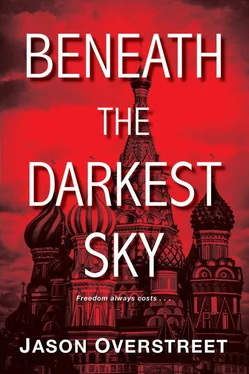My left arm felt fractured and was limp, so using my mangled right hand, I pushed at his chest and scooted out from under. I surveyed the silent crowd before turning toward the bosses, the anger on their faces suggesting I’d just murdered their wives. The American had won. The American was still alive. I closed my eyes and waited. It had been fourteen years since my life was embroiled in violence. Those years had been a reprieve from having to question how to simply stay alive.
I opened my eyes and looked at the black night beyond the quiet zeks . I yearned for the simplicity of everyday, normal life. I realized that my current predicament had been born out of a desperate yearning to transport some nonexistent model of freedom back to America, some philosophy that might take hold there and transform the lives of my people. I’d been suckered into believing that the Bolshevik Revolution had created a completely equal society based on certain principles, ones that could serve as the blueprint for solving America’s racial woes, ones that would show U.S. blacks and whites how to live in peace and harmony, ones that President Roosevelt was viewing from afar and basing his New Deal on.
I kept staring at the night sky and realized that my life’s purpose seemed to be cheating death over and over again, all in my impossible quest to finally reach this imagined utopia. Why hadn’t I settled on a simple life in Paris? The answer: God had placed deep inside of me a compass that was always turning toward freedom, guiding my every move, forcing me to disregard logic and pursue that intangible, elusive something that represented fairness for American Negroes, even if it was merely some abstract semblance of it. I imagined that slave of long ago, of my ilk, being told that he might be able to buy his freedom if he plays his cards right. He could only turn to his master and say, “Unless I can buy everyone’s, each and every one of my brothers’ and sisters’ freedom, what difference does it make?”
Continuing to stare beyond the crowd at dark nothingness, I wondered if my sentence would indeed be reduced to eight years. Even if it was, I wasn’t about to serve it out without doing everything in my power to get released sooner. I feared that, at this rate, every member of my family would be dead within a year or two.
Again I turned to the bosses. And once more I waited. But no one said a word or lifted a finger as I stood there bleeding and shaking. They could only stare at their fallen Goliath. I was tired and beaten and sad and lonely. But I still had hope.
Moscow, Russia
September 1934
I’D BEEN IN MOSCOW FOR A MONTH NOW, MY FAMILY LIVING IN A wonderful apartment on Arbat Street, only a few houses down from where the famed writer Alexander Pushkin had once resided. This neighborhood’s living quarters were quite different from others in terms of aesthetics, as the buildings were made of stone and brick. It was nice not having to live in one of the many one-story log row houses available to most tenants.
Bobby had helped us find the apartment. It was part of a large, white four-unit building—two apartments on the second floor, two on the first. Our unit was on the left side, first floor. We figured the entire building had once been a czar’s fancy house. Perhaps after the revolution it had been remodeled to create four apartments. Whatever the case, our two-bedroom unit was plenty spacious.
Our stay at the National Hotel had lasted only a week. I never told Bobby that I’d overheard his conversation with the ambassador regarding his desire not to have my family live at the chancery with the other staff. I’d preempted any pending discussion on the matter by simply expressing to Bobby my preference to live in a place large enough for Loretta to do her painting and readily host artists for events. This prompted Bobby to raise my level of pay, allowing us to easily afford the apartment. I was happy to have eased his private worry over the matter. Initially, I had refused to accept his side money, prompting him to spill his soul a bit to me.
“Please don’t make an issue out of the extra money,” he’d said. “It is truly our wish for you to accept it. Money can never become an issue between us, Press. I have learned to accept this idea as well, you know, with my being married to Dorene. Her wealth is just a reality, and as a subject, it’s completely off of the table between us. We’ve chosen to serve our government, not to dwell on our riches. The fact that we can travel and serve abroad without worry is a blessing. I need you to join me in this thinking. You’re my right-hand man. We can be a team.”
“Okay,” I had said, just before he’d gone into a riff about race, which told me he was still pained over the conversation he’d had with Bullitt behind the car that day.
“I can’t stop thinking how much I wish it were as easy for you to become a diplomat as me,” he’d gone on. “Segregation and overall racism is ubiquitous—and evil! But let me help you navigate through it until, God willing, we can come upon a better day. This apartment is certainly fit for a diplomat. Plus, helping you live in this fine establishment so that your wife can do her art is the least I can do. The least you can do is accept.”
This conversation had left the two of us feeling even closer. Since then we’d been engrossed in our jobs, working nonstop on the passport issue plaguing so many American expatriates. It was exhausting work that required lots of research and document reading. But, as we’d anticipated, I was now being summoned to the ambassador’s residence to help advise on the new ballroom, an assignment that irked the hell out of Bobby. But what could he do about it?
I arrived for my first day of work at Spaso House on a Monday morning and was led through the chandelier room into an adjacent area where several walls had been knocked down. The floor was covered in drywall dust, and so were the eight men standing around a large worktable arguing about logistics.
“This one shows that we cannot knock that west wall down because it is essential to the house’s structural support,” said a tall, fat man who appeared to be the lead contractor. His Russian words bellowed out in a deep baritone.
“Excuse me!” I said, interrupting.
“Yes!” said the fat man.
“I’m Prescott Sweet. The ambassador has hired me to help as a technical advisor.”
“Ah, yes! Comrade Sweet! Please! Come join us! I am so glad to hear an American speak Russian. My name is Makar.”
A couple of the men moved aside and created some space for me to join them around the table. Then they all introduced themselves.
“Don’t take this personally,” said Makar, “but I have been going back and forth with… let me whisper… with your ambassador about my electrician. He will not even allow Egor in the building because he has demanded that one of his men do the job. I assume that is you.”
“That is correct,” I said, trying not to act surprised at this news.
“He told me, Comrade Sweet, that no power can be shut off until you’ve had a chance to study the drawings and inspect all of Spaso House’s wiring. He claims that the lights go out at night all of the time and that the phone often doesn’t work. He also claims that all of the food in the refrigerator keeps spoiling because of these late-night power outages. My electrician, Egor, could easily fix! If I sound angry that is because I am! Not at you, but, you know, this is your ambassador showing that he doesn’t trust me.”
“No!” I said, preparing to defend the ambassador as best I could.
“What do you mean… no ?”
“I mean… I think it has more to do with him feeling like a brand-new set of electrical materials will need to be ordered from America, and that I can recommend the highest quality ones. America’s made new advancements in wiring technology. He also believes I’ll be able to determine what’s causing things to short-circuit so often. I’m an expert in that area. It probably has to do with the house’s outdated system not being able to support the amount of wattage being regularly used, especially at night, when so many lights are turned on. The last thing the ambassador wants is to be hosting a big social event, only to have a blackout.”
Читать дальше











